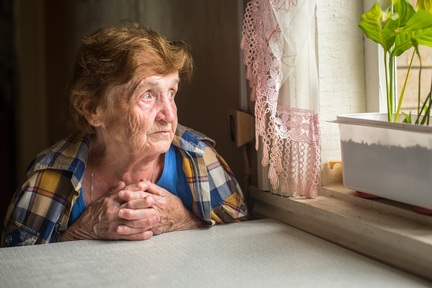Coronavirus could see over 70s in lockdown and care providers sharing workforce
Health secretary Matt Hancock has said over-70s will be told within weeks to stay at home for up to four months, while the NHS will work with care homes and home care providers on contingency plans which could see providers sharing their workforce.

Mr Hancock has said Britain’s 9.2 million over-70s will be told to self-isolate "'within the coming weeks" for their own protection as part of measures which are likely to last for up to four months.
Home care as well as care home providers are advised under new government COVID-19 guidance (published on 13 March) to ‘consider arrangements to support sharing of the workforce’ between providers as well as with ‘local primary and community services providers’.
The guidance covers different scenarios relating to care homes, staff and providers who care for people in their own homes.
The government has said the NHS is working with care providers ‘to ensure people can receive best possible care in their communities’. The NHS is also looking at how tele-care and digital appointments can help, with GPs asked to consider offering digital appointments to patients.
In an interview with the BBC on 15 March, Mr Hancock also said people aged over 70 and those with underlying health conditions will soon be asked to remain at home. He said the move would require a "massive community response".
In guidance issued for adult social care Mr Hancock said: “We are working closely with partners from across the social care sector to ensure local authorities, care providers and our health and social workforce are prepared to take action to protect our most vulnerable.
“Local authorities will work with the NHS and care providers to bring together their pre-existing contingency preparations and make sure each decision is made with the best public health and clinical advice at its heart.”
Elderly people and those with underlying health conditions are more likely to develop serious complications if they become infected with COVID-19. Councils have been told to ‘map out’ all care plans to prioritise people who are at the highest risk and contact all registered providers in their local area to facilitate plans.
Home care and residential care providers will be given ‘a free issue’ of personal protective equipment (PPE) such as gloves and aprons to care for patients with COVID-19 symptoms.
There are some 1.49 million social care workers in the country, according to Skills for Care.
The government’s COVID-19 guidance recommends:
• Anyone who is suspected of having COVID-19, with a new continuous cough or high temperature, should not visit care homes or people receiving home care and should self-isolate at home.
• People receiving care be isolated in their rooms, if they have symptoms of coronavirus.
'Incredibly challenging time for care workers'

Minister for Care, Helen Whately said: “We recognise that we are entering an incredibly challenging time for people living and working in care and we are working closely with industry experts to do everything we can to limit the impact that COVID-19 has on the most vulnerable.
“This guidance is an important part of that work. Its aim is to help the NHS, local government and care providers to work together to take the best steps to protect those most at risk.”
The guidance advises if neither the care worker nor the individual receiving care and support is symptomatic, then no personal protective equipment (PPE) is required above and beyond normal good hygiene practices.
If someone receiving care has COVID-19 symptoms, the guidance advises:
• Care workers should use PPE for activities that bring them into close personal contact, such as washing and bathing, personal hygiene and contact with bodily fluids. • Aprons, gloves and fluid repellent surgical masks should be used in these situations. If there is a risk of splashing, then eye protection will minimise risk.
• New PPE must be used for each episode of care. PPE must be stored securely within disposable rubbish bags.
• These bags should be placed into another bag, tied securely and kept separate from other waste within the room. This should be put aside for at least 72 hours before being put in the usual household waste bin.
If a care worker is concerned they have COVID-19, they must follow NHS advice.
If they are advised to self-isolate at home they should follow the stay at home guidance.
As part of the Government’s emergency legislation measures, care workers and others on zero-hour contracts will receive Statutory Sick Pay if their average earnings are at least £118 per week (calculated over an eight-week period).
The government advises anyone who develops a new and continuous cough or a fever to stay at home for 7 days to limit the spread of the virus. Anyone out in the community is advised to wash their hands frequently for 20 seconds or more.
The Department of Health and Social Care (DHSC) has stated that care and support in people’s home ‘is largely an emergency service’. ‘It is therefore vital that these services are prioritised. This guidance is designed to support that.’
The government has said it plans to issue more guidance to help protect elderly and vulnerable groups and has launched a new taskforce of experts across sectors to tackle the outbreak of coronavirus including experts in adult social care.
Care minister Helen Whately added: “The social care workforce works tremendously hard to care for people of all ages with complex health needs. I am sincerely grateful for their commitment to the people they care for, now more than ever.”
To read the DHSC guidance click here
Latest News
 29-Jul-24
Dementia Bus gives carehome.co.uk staff insight into life with dementia
29-Jul-24
Dementia Bus gives carehome.co.uk staff insight into life with dementia
 01-Mar-24
Find out the top care homes in 2024
01-Mar-24
Find out the top care homes in 2024
 21-Mar-23
UK's top care homes in 2023 revealed
21-Mar-23
UK's top care homes in 2023 revealed
 03-Jan-23
carehome.co.uk launches free care helpline
03-Jan-23
carehome.co.uk launches free care helpline
 13-Dec-22
5 mins with Emily Whitehurst, chief operating officer for Constantia Healthcare
13-Dec-22
5 mins with Emily Whitehurst, chief operating officer for Constantia Healthcare